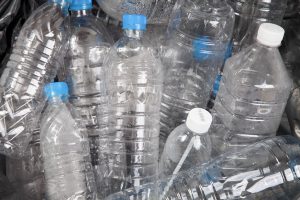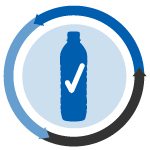French company Carbios has developed an enzyme-based recycling technology, which breaks down PET into monomers that can be used to create new plastic. Continue Reading

French company Carbios has developed an enzyme-based recycling technology, which breaks down PET into monomers that can be used to create new plastic. Continue Reading

The location of the planned PS foam recycling facility adjacent to an existing bromine recovery unit in Terneuzen, Netherlands.
European groups are backing an initiative to recycle polystyrene materials containing a banned flame retardant. They recently reported key progress in their effort.
 Scientists are using an enzyme to break down PET and PU into their component monomers and then employing bacteria to rebuild them into a PHA bioplastic. Continue Reading
Scientists are using an enzyme to break down PET and PU into their component monomers and then employing bacteria to rebuild them into a PHA bioplastic. Continue Reading
 Equipment companies release innovative optical sortation technologies, and the Association of Plastic Recyclers recognizes research improving recyclability.
Equipment companies release innovative optical sortation technologies, and the Association of Plastic Recyclers recognizes research improving recyclability.
A new group in Europe is working to build a demonstration plant to recycle EPS building insulation containing a brominated flame retardant.
 A European Union panel approved a pair of proposals that bring recovered material into plastic food and beverage packaging.
A European Union panel approved a pair of proposals that bring recovered material into plastic food and beverage packaging.
 Spanish researchers develop special washing and extrusion methods to remove odors when recycling EPS fish boxes, and Keurig says it is aiming to produce recyclable K-Cup coffee capsules.
Spanish researchers develop special washing and extrusion methods to remove odors when recycling EPS fish boxes, and Keurig says it is aiming to produce recyclable K-Cup coffee capsules.
 A Canadian community removes EPS from its curbside recycling program, and Greenpeace offers the soda industry a big thorn and a little rose over its plastic usage.
A Canadian community removes EPS from its curbside recycling program, and Greenpeace offers the soda industry a big thorn and a little rose over its plastic usage.
 A wet shredder and hydrocyclone separation system from Herbold Meckesheim is helping a Netherlands reclaimer process film for recycling.
A wet shredder and hydrocyclone separation system from Herbold Meckesheim is helping a Netherlands reclaimer process film for recycling.
 A facility near London is using a new baffled oscillation technology to separate PP and PE in a water tank, and a study says more rPET could be used in hot-fill containers.
A facility near London is using a new baffled oscillation technology to separate PP and PE in a water tank, and a study says more rPET could be used in hot-fill containers.
